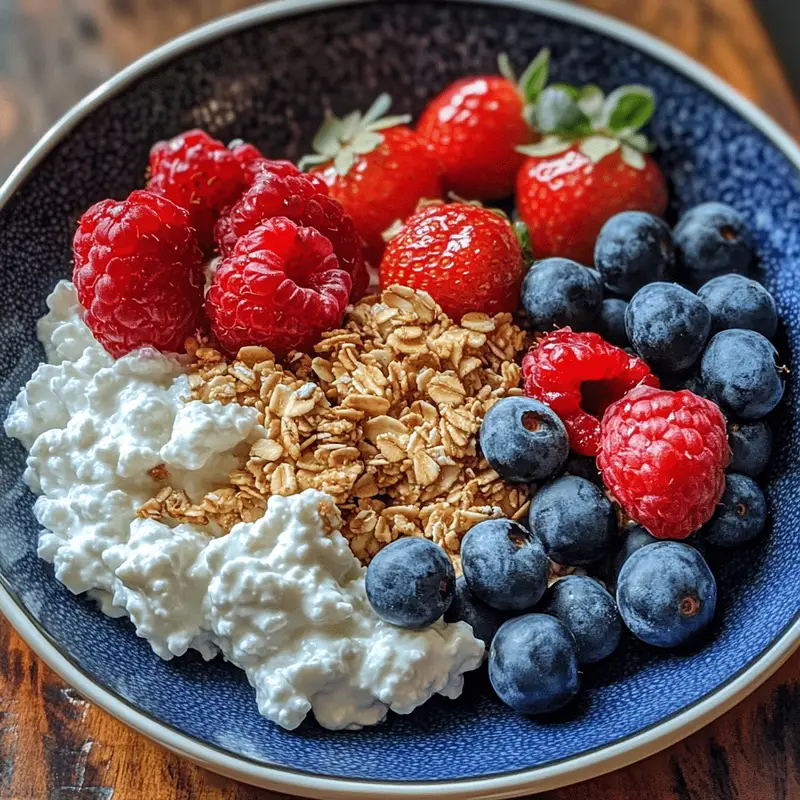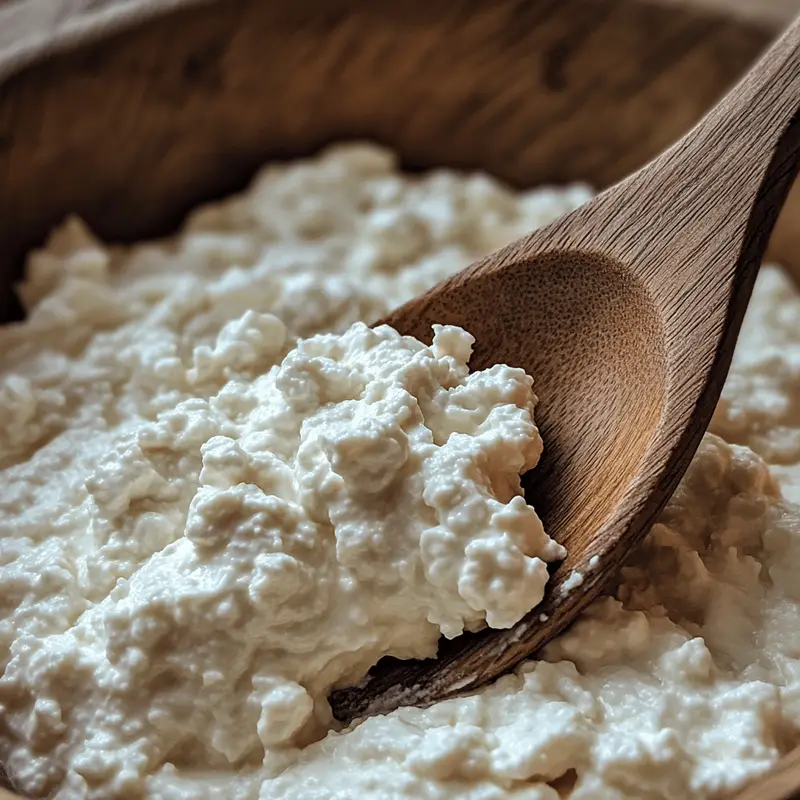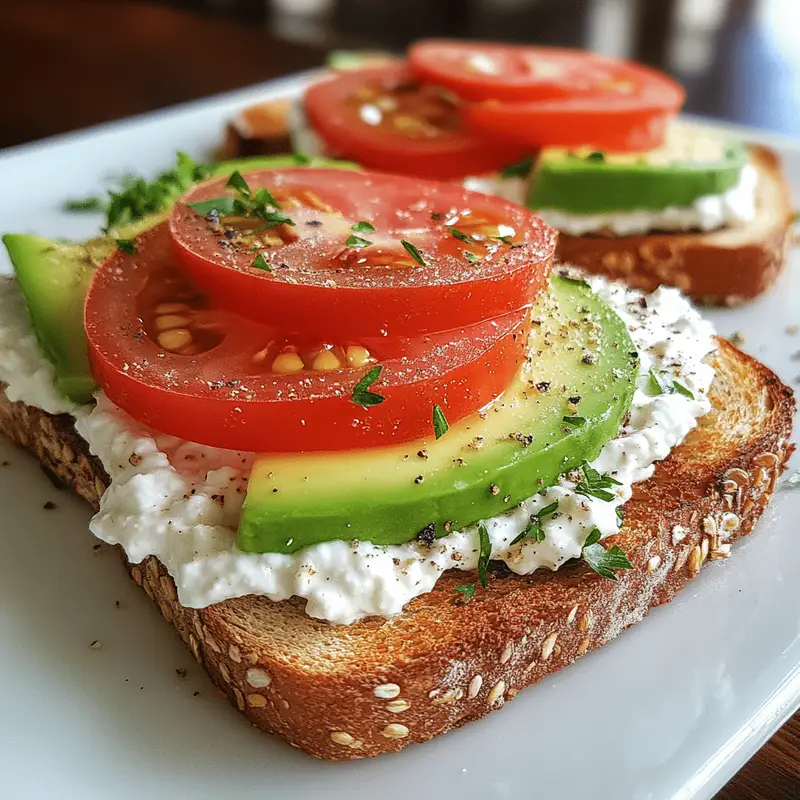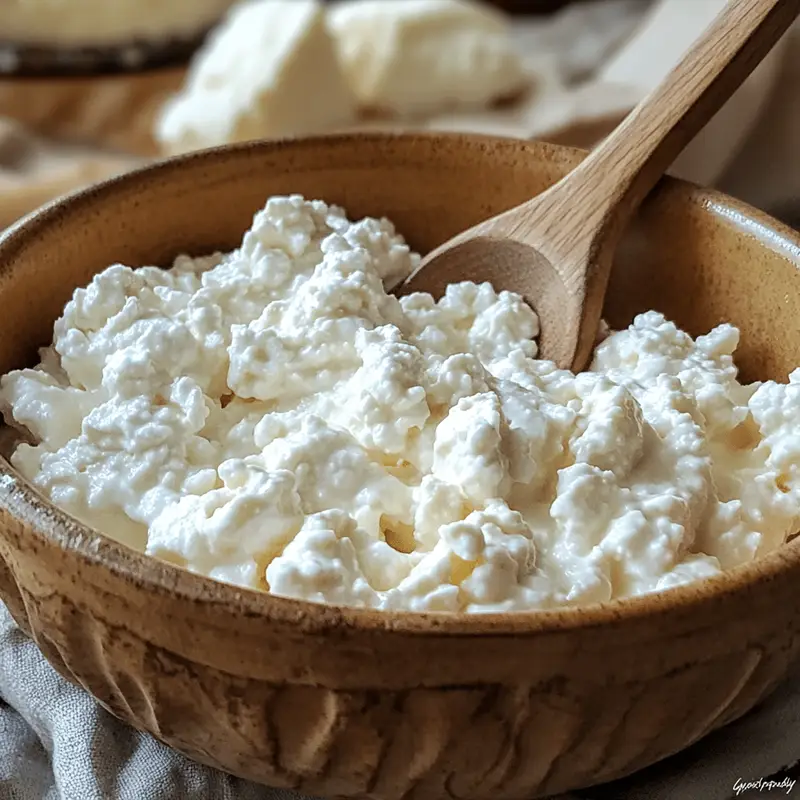Lactose free cottage cheese has been a lifesaver in my kitchen, especially on those mornings when I want to enjoy a high-protein breakfast without the stomachaches. Hi, I’m Emily Parker a busy mom always looking for recipes that make my family’s meals easier and healthier. Growing up in Oklahoma, cottage cheese was a staple at our Sunday dinners, but it wasn’t until later that I realized not everyone’s stomach tolerates it the same way.
That’s where lactose free cottage cheese comes in. It’s a delicious, protein-rich option that’s perfect for anyone who loves cottage cheese but struggles with lactose. In this guide, I’ll answer common questions like “Is there a cottage cheese without lactose?” and “Why does my stomach hurt when I eat cottage cheese?” so you can enjoy your favorite recipes like my cottage cheese chocolate mousse without worry.
I’ll also share where to find lactose free cottage cheese, how to use it in recipes like cottage cheese bagels and cottage cheese pizza crust, and why it’s a must-have for any kitchen. Let’s dive in!
Print
Lactose Free Cottage Cheese: The Best Dairy-Free Option for Everyone
- Total Time: 5 minutes
- Yield: Varies
Description
Lactose free cottage cheese is a lifesaver in the kitchen especially for those who crave all the creamy goodness of traditional cottage cheese without the stomachaches. Discover everything you need to know, including where to buy it, how it’s made, and how to use it in your favorite recipes.
Ingredients
- Lactose-free cottage cheese
- Lactase enzyme (used in production)
- Lemon juice or white vinegar (for homemade versions)
- Salt (optional, for flavoring)
Instructions
- Understand the benefits: Lactose free cottage cheese is made by adding lactase enzymes during production. This breaks down the lactose, making it easier to digest for people with lactose intolerance.
- Learn how it’s made: During production, milk is pasteurized, lactase enzyme is added, and the mixture is cultured to create curds and whey, similar to traditional cottage cheese. The curds are then rinsed and salted.
- Buy it at the store: Look for lactose free cottage cheese at major supermarkets like Walmart, Kroger, and Whole Foods. Brands like Green Valley Creamery and Lactaid are popular choices.
- Use it in recipes: Try it in dishes like cottage cheese bagels, pizza crust, chocolate mousse, baked eggs, or breakfast bakes for a protein-rich meal without the lactose.
- Make it at home: Heat lactose-free milk, add an acid (like lemon juice or white vinegar) to curdle the milk, strain the curds, rinse, and salt to taste. Adjust the milkfat to achieve your desired creaminess.
- Enjoy without worry: This guide covers common questions, including why your stomach might hurt after eating regular cottage cheese, and highlights the difference between lactose free cottage cheese and dairy-free alternatives.
Notes
When buying at the store, always check the label for ‘100% lactose-free’ to ensure the product is safe for your diet. For homemade versions, use lactose-free milk to guarantee no lactose remains. Brands like Green Valley Creamery and Lactaid consistently deliver quality options.
- Prep Time: 5 minutes
- Cook Time: 0 minutes
- Category: Cottage Cheese Low Carb
- Method: No Cook
- Cuisine: American
Nutrition
- Serving Size: Varies
Table of Contents
Table of Contents
Understanding Lactose Free Cottage Cheese
What is Lactose Free Cottage Cheese?
Lactose free cottage cheese is a specially crafted version of the classic dairy product that’s designed to be gentle on your stomach. Unlike regular cottage cheese, it undergoes a process where the naturally occurring milk sugar lactose is either removed or broken down using lactase enzymes. This means people with lactose intolerance can enjoy all the creamy goodness without the worry of digestive upset.
The process involves adding the lactase enzyme to the milk used in cottage cheese, breaking lactose down into simpler sugars like glucose and galactose. These sugars are easier to digest and don’t trigger the bloating, gas, or stomach pain that often comes with lactose consumption. This simple yet effective step transforms regular cottage cheese into a lactose-free delight.
How is it Made: The Lactose Removal Process
The magic of lactose free cottage cheese begins during the production phase. First the milk is pasteurized to kill any harmful bacteria. Then, the lactase enzyme is introduced, which starts the lactose breakdown process. This enzymatic reaction typically takes place before the curdling stage, ensuring that the final product is easy on your gut.
After the enzyme has done its job, the milk is cultured and separated into curds and whey, just like traditional cottage cheese. The curds are then rinsed, salted, and packaged, ready for you to enjoy.. This process preserves the classic taste and texture, giving you all the nutrition and creaminess of regular cottage cheese, but without the lactose woes.
Where to Buy Lactose Free Cottage Cheese
Major Supermarkets and Online Options
You’ll find lactose free cottage cheese at most major supermarkets like Walmart, Kroger, and Whole Foods. Look for brands like Green Valley Creamery and Lactaid in the dairy section or specialty health foods aisle. For convenient home delivery, Amazon Fresh and Instacart stock several top brands.
If you’re craving something different, try experimenting with recipes like our cottage cheese pizza crust a creative, lactose free dinner idea that’s both tasty and nutritious.
Does Walmart Carry Lactose-Free Cottage Cheese?
Absolutely! Walmart frequently carries lactose-free cottage cheese brands, including Green Valley Creamery and Lactaid. Just be sure to check the label carefully some brands market themselves as “lactose-reduced,” which might still contain traces of lactose. Look for labels that say “100% lactose-free” for the best results.
Where to Buy Lactose Free Cottage Cheese
Major Supermarkets and Online Options
You’ll find lactose free cottage cheese at most major supermarkets like Walmart, Kroger, and Whole Foods. Look for brands like Green Valley Creamery and Lactaid in the dairy section or specialty health foods aisle. For convenient home delivery, Amazon Fresh and Instacart stock several top brands.
Does Walmart Carry Lactose Free Cottage Cheese?
Absolutely! Walmart frequently carries lactose free cottage cheese brands, including Green Valley Creamery and Lactaid. Just be sure to check the label carefully some brands market themselves as “lactose-reduced,” which might still contain traces of lactose. Look for labels that say “100% lactose-free” for the best results.
Is There Cottage Cheese Without Lactose?
Answering the Common Questions
One of the most frequently asked questions about dairy is: “Is there cottage cheese without lactose?” The answer is a resounding yes! Thanks to advances in food science and the increased demand for lactose-free options, several reputable brands now produce cottage cheese that’s completely free of lactose. This allows people with lactose intolerance to enjoy all the creamy goodness of cottage cheese without worrying about digestive issues.
Lactose-free cottage cheese is made using special lactase enzymes that break down the lactose into simpler sugars, such as glucose and galactose, that your body can digest easily. This process ensures that even those with severe lactose intolerance can enjoy this popular dairy treat with confidence.
Best Brands That Offer Lactose-Free Options
When it comes to choosing a brand, a few stand out for their dedication to quality and flavor. Green Valley Creamery is a favorite, known for its smooth texture and natural taste. Lactaid also offers a reliable option that’s widely available in many grocery stores, including Walmart.
If you’re seeking versatility, try pairing your lactose-free cottage cheese with recipes like our baked cottage cheese eggs or using it as a base for a creamy, protein-packed blueberry cottage cheese breakfast bake. Both options offer a delicious way to integrate this gut-friendly treat into your daily meals.

Is There Lactose Free Cottage Cheese?
Answering the Common Questions
One of the most common questions from people seeking a more comfortable dairy experience is: Is there lactose free cottage cheese? The answer is a big yes! Thanks to advancements in food technology and a growing demand for digestive-friendly dairy, several popular brands now offer high-quality lactose free cottage cheese options. This means you can savor the creamy, tangy goodness of cottage cheese without worrying about bloating, gas, or stomach discomfort.
Lactose free cottage cheese is created by adding lactase enzymes during production. These enzymes effectively break down the lactose into simpler, easy-to-digest sugars like glucose and galactose. This process transforms traditional cottage cheese into a gut-friendly product that’s perfect for anyone who’s lactose intolerant or simply looking to reduce their lactose intake.
Don’t miss the chance to indulge your sweet tooth with our cottage cheese chocolate mousse a delicious, lactose free dessert that’s as smooth as it is satisfying.
Best Brands That Offer Lactose Free Cottage Cheese
When shopping for lactose free cottage cheese, you’ll find several excellent brands committed to delivering both quality and flavor. Green Valley Creamery is a top choice, offering a smooth, creamy texture that’s hard to beat. Lactaid is another well-known brand that consistently delivers reliable, delicious lactose free cottage cheese products.
For those who like to get creative in the kitchen, try incorporating lactose free cottage cheese into recipes like our baked cottage cheese eggs or our mouthwatering blueberry cottage cheese breakfast bake. Both are fantastic ways to enjoy this versatile ingredient while sticking to your dietary needs.
Homemade Lactose Free Cottage Cheese
Simple Recipes to Try at Home
Making lactose free cottage cheese at home might sound intimidating, but it’s actually easier than you think. By using lactose-free milk (which is widely available in most supermarkets) and adding a few simple ingredients, you can craft a fresh, creamy batch of lactose free cottage cheese right in your own kitchen.

Start by heating lactose-free milk in a saucepan over medium heat until it’s just about to boil. Add an acid like lemon juice or white vinegar to help the milk curdle and separate. Once the curds form, strain them through cheesecloth or a fine mesh sieve to remove the whey. Rinse the curds gently with cold water to cool them down and remove any lingering acidic flavor. Add a pinch of salt and mix well for a tasty, protein-packed treat that’s gentle on your stomach.
This easy recipe ensures that your homemade lactose free cottage cheese retains all the protein, calcium, and delicious taste of the store-bought version without the worry of stomach pain.
Tips for Getting the Texture Right
Homemade lactose free cottage cheese is all about balance. For a creamier texture, use whole lactose-free milk. For a firmer, drier texture, consider using 2% or skim lactose-free milk instead. Stirring gently during curd formation helps maintain the integrity of the curds and prevents them from becoming too fine.
Don’t forget that making tasty lactose-free cottage cheese takes a bit of patience and practice. With each batch, you’ll get better at achieving that perfect creamy consistency that rivals even the best store-bought brands.
Stomach Issues and Cottage Cheese
Why Does My Stomach Hurt After Eating Cottage Cheese?
Ever wondered why your stomach feels upset after indulging in a bowl of cottage cheese? For many people, the answer lies in lactose. Regular cottage cheese naturally contains lactose, the milk sugar that can cause bloating, gas, and cramping in those who are lactose intolerant. Fortunately, lactose free cottage cheese offers a gentle alternative that allows you to enjoy all the benefits of cottage cheese without the discomfort.
Lactose free cottage cheese is made by breaking down lactose with the enzyme lactase, transforming it into easier-to-digest sugars like glucose and galactose. This process effectively removes the root cause of stomach pain for people who struggle with lactose intolerance. So, if you experience discomfort after eating traditional cottage cheese, switching to lactose free cottage cheese could be the solution you’ve been searching for.
How to Tell if You’re Lactose Intolerant
Lactose intolerance is more common than many people realize. If you experience bloating, gas, stomach cramps, or diarrhea after eating dairy, you might be among the millions of Americans who are lactose intolerant. One simple way to test it out is to try switching to lactose free cottage cheese and see if your symptoms improve.
Unlike regular cottage cheese, lactose free cottage cheese eliminates the problem by removing lactose during production. This makes it an excellent choice for anyone who wants to enjoy dairy without digestive discomfort. And don’t forget it’s packed with protein and calcium, so you’re not missing out on any essential nutrients.
Don’t miss out on tasty ideas! Our blueberry cottage cheese breakfast bake is the perfect example of how lactose free cottage cheese can be a delicious part of your breakfast rotation.
Incorporating Lactose Free Cottage Cheese Into Your Diet
Meal Ideas and Recipes
Adding lactose-free cottage cheese to your everyday meals is a delicious and simple way to increase your protein and calcium levels. Its smooth texture and subtle taste make it wonderfully adaptable, whether you’re cooking something sweet or savory.

Start your day right by adding lactose free cottage cheese to your breakfast. Spread it on whole grain toast with sliced tomatoes and avocado for a balanced, satisfying meal. Craving something sweet? Top it with fresh berries and a drizzle of honey for a quick, protein-packed snack. You can even use lactose free cottage cheese as a base for smoothies, giving them a protein boost without the digestive upset.
Using Lactose Free Cottage Cheese in Baking and Snacks
Lactose free cottage cheese isn’t just for meals it’s a secret weapon for baking and snacks too! Its rich, creamy texture helps keep baked goods moist and enhances their flavor.
Try adding it to muffins, pancakes, or even cheesecake recipes to create healthier versions of your favorite treats.
If you’re looking for something savory, mix lactose free cottage cheese into dips and spreads for crackers or veggie sticks. It adds richness without the lactose. Our baked cottage cheese eggs are another creative way to bring this versatile ingredient into your snack game.
Adding lactose free cottage cheese to your daily diet is an easy and delicious way to make sure you’re getting all the protein and calcium you need, without sacrificing taste or comfort.
Lactose Free Cottage Cheese vs. Dairy-Free Alternatives
Understanding the Difference
When it comes to choosing the right dairy product for your diet, it’s essential to understand the difference between lactose free cottage cheese and dairy-free alternatives. Lactose free cottage cheese is still made from real dairy milk, but it’s treated with lactase enzymes to break down the lactose, making it easier to digest for those who are lactose intolerant. This means you get all the nutrition of regular cottage cheese protein, calcium, and essential vitamins with none of the stomach troubles.
On the other hand, dairy-free alternatives are typically made from plant-based sources like almonds, soy, or coconut. These products are entirely free of animal dairy, making them suitable for vegans or those with dairy allergies. However, they may differ in protein content, texture, and flavor.
If you’re a cheese lover looking for a genuine dairy taste, lactose free cottage cheese is your best bet. It offers the same creamy texture and authentic flavor that plant-based alternatives often can’t fully replicate.
Best Uses for Each Type
Lactose free cottage cheese is incredibly versatile, making it ideal for breakfasts, snacks, and even baking. It can be spread on toast, mixed into smoothies, or used in recipes like our blueberry cottage cheese breakfast bake for a nutritious start to the day.
Meanwhile, dairy-free alternatives are best for those who need or choose to avoid all forms of dairy. They can be a good option for vegan recipes, though they might not always offer the same protein punch as lactose free cottage cheese. Keep in mind that plant-based options often have a different flavor profile, so experimenting with recipes might be necessary.
So, whether you’re looking for the authentic taste of dairy without the lactose, or a fully plant-based option, both choices have their place. But for the best combination of flavor, texture, and nutrition, lactose free cottage cheese remains a top contender.
Conclusion
Lactose free cottage cheese is a game-changer for those who love the creamy taste of cottage cheese but struggle with lactose intolerance. From its high protein and calcium content to its versatility in both sweet and savory recipes, this gut-friendly dairy option makes it easier than ever to enjoy nutritious meals without discomfort. Whether you’re shopping at Walmart, creating homemade recipes, or exploring creative dishes like cottage cheese pizza crust, lactose free cottage cheese is the answer to all your dairy dilemmas.
Wave farewell to digestive discomfort and embrace a world of creamy, tasty options with lactose-free cottage cheese.
👉 Follow us on Pinterest for the latest updates! for more delicious recipes
FAQs
Is There a Cottage Cheese Without Lactose?
Yes! There is indeed lactose free cottage cheese available in most grocery stores today. Thanks to food science advancements, brands now offer products that use lactase enzymes to remove the lactose, so you can enjoy cottage cheese without stomach discomfort. It’s the same creamy texture and delicious flavor just easier on your digestion.
Can You Buy Cottage Cheese Lactose Free?
Definitely. You can buy lactose free cottage cheese at major supermarkets like Walmart, Target, and Kroger, as well as online. Popular brands include Lactaid and Green Valley Creamery. Always check the label to make sure it says “100% lactose free” to ensure it’s right for your dietary needs.
Does Walmart Carry Lactose Free Cottage Cheese?
Walmart usually stocks lactose free cottage cheese in the dairy aisle or near the specialty health foods section. Brands like Lactaid and Green Valley Creamery are often available in-store and online. To make sure you’re getting the real deal, always check the label for “lactose free.”
Why Does My Stomach Hurt When I Eat Cottage Cheese?
Traditional cottage cheese contains lactose, which can cause stomach discomfort if you’re lactose intolerant. Symptoms like bloating, cramps, and gas are common. Switching to lactose free cottage cheese can help you avoid these issues, letting you enjoy the nutritional benefits of cottage cheese without the pain.



